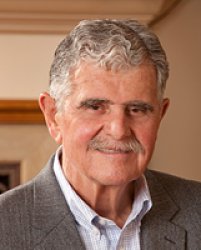Dean A. Cortopassi*
Class of 2005
- CEO San Tomo Group

To me, the definition of success is performing at your maximum potential without ever compromising your character or personal values.
The son and grandson of Italian immigrants, Dean Cortopassi was born in 1937. Even though his family worked hard, he remembered plenty of laughter at home. For the first 10 years of Cortopassi's life, the family lived on a farm, but moved in 1947 to a working-class Italian neighborhood. Cortopassi's father commuted to their farm on the outskirts of town. "In my community everyone was focused on '˜getting ahead' to achieve a better life. It was a very insular community that was strong on values and family honor. My parents would constantly say '˜Go to school, get a good job, and have a good life.' They both saw farming as a tough way to make a living and they didn't want that for their children, but it was all I ever wanted to do."
As a youngster, Cortopassi clearly remembered playing farmer in his sandbox with toy wooden tractors that his father had made for him. "My father was a hero for me," he said, "and I think that's why I loved farming so much." Cortopassi began working on the farm when he was 10, driving a grain truck from field to bin. When he was 12, he graduated to the top tractor job on the farm and pulled the grain harvester.
Cortopassi attended a one-room schoolhouse during his first three years and was skipped ahead one grade when the family moved to town. In his last semester of high school, Cortopassi contracted rheumatic fever, which left him with a damaged heart valve; his doctors warned him against physical activity. Nevertheless, he attended junior college for two semesters, trying to catch up with friends away at college, but quit school to work full time as a commercial truck driver. Within six months Cortopassi's high-energy work habits resulted in a mild heart attack and a complete prohibition from any physical labor for two years.
Having few options, Cortopassi enrolled in a two-year agriculture course at the University of California at Davis and graduated in 1958. He joined the Pillsbury Company as a grain buyer and trader; at the same time, Cortopassi and his younger brother began farming 65 rented acres with rented equipment. By 1961, the brothers were into full-time farming, followed by years of both adversities and success. Within 20 years, Cortopassi Farms had grown to 10,000 acres.
By 1968, Cortopassi had achieved his dream of farming on a large scale, but felt limited by farming's strategic limitations, so he went into partnership with another farmer and bought a small Los Angeles-based food specialties company that sold its products through supermarket channels. Ten years later, the partners sold that firm and raised a larger partnership to buy a tomato processing company, Stanislaus Food Products (SFP). SFP became Cortopassi's primary endeavor as he began scaling down on farming activities.
Following a poor farming year in 1982, his partner elected to sell his SFP stock ownership, which Cortopassi bought with borrowed bank debt. In 1986, the entrepreneur re-mortgaged his entire SFP ownership to buy out all remaining shareholders. Over the past 25 years, SFP has become the largest "fresh-pack" cannery in the world, it leads the U.S. and Canadian market share in tomato products for Italian restaurants.
Cortopassi later became CEO of San Tomo Group, and he has provided "coaching" to younger presidents of agribusiness entities in which his family are shareholders, such as SFP, Cortopassi Partners, Cocoa Farms, Lodi Farming Company, and Del Rio Partners.
Asked to define success, Cortopassi said, "It's constantly striving to perform at maximum potential without compromising personal values. It's about my word, my family, and my honor. I always remember a metaphor from the Greek classics about Plato's ring. Plato told his students that to know your own morality, imagine slipping on a magic ring that made you invisible and therefore able to do bad deeds without anyone ever knowing. If you had such a ring, how would you behave? The answer to that question is the definition of your morality."
Cortopassi advised young people to choose a line of work they can be passionate about, and then to seek work from the best company in that industry. "When you go to work for the best doing something you like, you're earning double pay because in addition to salary you're learning keys to success."
Outside of his family and business, Cortopassi is passionate about the United States. "I'm glad for my Italian roots, but I'm proud to be an American," he said. "My parents were particularly passionate about their American citizenship and are a living example of moving from meager circumstances in Italy and through determination and hard work achieving a better life in America. I believe in free enterprise and I want our country to continue providing '˜getting ahead' opportunities for entrepreneurs."
